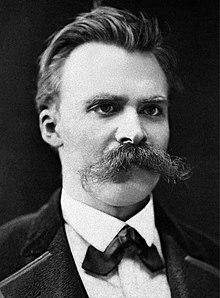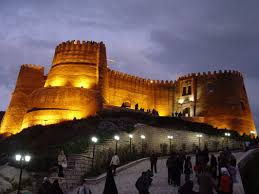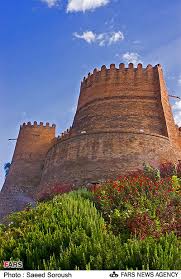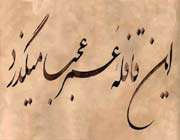دنیای زبان انگلیسی ( بهروزپور )
لغات و اصطلاح .داستان کوتاه . شعر.جوک .ضرب المثل.اشپزی.رمان. نمایشنامه.متن دوزبانهدنیای زبان انگلیسی ( بهروزپور )
لغات و اصطلاح .داستان کوتاه . شعر.جوک .ضرب المثل.اشپزی.رمان. نمایشنامه.متن دوزبانهModern Library 100 Beste Romans
ادامه مطلب ...Friedrich Wilhelm Nietzsche : نیچه
Friedrich Wilhelm Nietzsche (German pronunciation: [ˈfʁiːdʁɪç ˈvɪlhɛlm ˈniːtsʃə]; in English UK: /ˈniːtʃə/, US: /ˈniːtʃi/[1]) (October 15, 1844 – August 25, 1900) was a 19th-century German philosopher and classical philologist. He wrote critical texts on religion, morality, contemporary culture, philosophy and science, displaying a fondness for metaphor, irony and aphorism.
Nietzsche's influence remains substantial within and beyond philosophy, notably in existentialism, nihilism, and postmodernism. His style and radical questioning of the value and objectivity of truth have resulted in much commentary and interpretation, mostly in the continental tradition. His key ideas include the death of God, perspectivism, the Übermensch, the eternal recurrence, and the will to power. Central to his philosophy is the idea of “life-affirmation,” which involves an honest questioning of all doctrines that drain life's expansive energies, however socially prevalent those views might be.[2]
Nietzsche began his career as a classical philologist before turning to philosophy. At the age of 24 he was appointed to the Chair of Classical Philology at the University of Basel (the youngest individual to have held this position), but resigned in 1879 due to health problems that plagued him most of his life. In 1889 he became mentally ill, possibly due to atypical general paralysis attributed to tertiary syphilis.[3] He lived his remaining years in the care of his mother until her death in 1897, then under the care of his sister until his death in 1900.
نامه نگاری انگلیسی ۴
نامه نگاری انگلیسی
هنگامی که نامه را به پایان میبریم استفاده از یک عبارت تعارفی و احترام آمیز جلوه بسیار خوبی به نامه می دهد.
عبارات مورد استفاده برای بستن و به پایان بردن نامه:
,Yours faithfuly
-------------------------------------------------------------------------
,Yours truly
------------------------------------------------------------------------
,Yours very truly
-----------------------------------------------------------------------
,Yours sincerely
-----------------------------------------------------------------------
,Yours affectionately
Falak-ol-Aflak Castle قلعه فلک الافلاک
History
Falak ol-Aflak castle is amongst the most important structures built during the Sassanid era. It has been known by a number of names since it was built over 1800 years ago. Recorded names have referred to it as Shapur-Khast or Sabr-Khast fortress, Dezbaz, Khoramabad castle, and ultimately the Falak ol-Aflak Castle.
During the Pahlavi dynasty it was used as a prison.
in ancient times known as Dežbār as well as Shāpūr-Khwāst) is a castle situated on the top of a large hill with the same name within the city of Khorramabad, the regional capital of Lorestan province, Iran. This gigantic structure was built during the Sassanid era (226 – 651).
The Khoramabad River runs past the eastern and south-western side of the Falak-ol-Aflak hill providing the fortress with an element of natural protection. Today, the western and northern sides of the hill are bordered by the residential districts of Khorramabad.
رمانJane Eyre
Plot introduction
Jane Eyre is a first-person narrative of the title character. The novel goes through five distinct stages: Jane's childhood at Gateshead, where she is emotionally and physically abused by her aunt and cousins; her education at Lowood School, where she acquires friends and role models but also suffers privations; her time as the governess of Thornfield Hall, where she falls in love with her Byronic employer, Edward Rochester; her time with the Rivers family at Marsh's End (or Moor House) and Morton, where her cold clergyman-cousin St John Rivers proposes to her; and her reunion with and marriage to her beloved Rochester. Partly autobiographical, the novel abounds with social criticism. It is a novel considered ahead of its time. In spite of the dark, brooding elements, it has a strong sense of right and wrong, of morality at its core.
Jane Eyre is divided into 38 chapters and most editions are at least 400 pages long (although the preface and introduction on certain copies are liable to take up another 100). The original was published in three volumes, comprising chapters 1 to 15, 16 to 26, and 27 to 38; this was a common publishing format during the 19th century, see Three-volume novel.
Brontë dedicated the novel's second edition to William Makepeace Thackeray.
ادامه مطلب ...ضرب المثل ۱
Persian Proverbs
"آب از دستش نمیچکه"
Literal Translation: Water does not trickle out of his hand.
Literal Translation: Even water doesn't trickle out his hand.
Connotation: He is a skinflint. She is tight-fisted.
English Equivalent: Short arms, long pockets. First one out the taxi, last one to the bar.
"آب از سر چشمه گل آلوده"
Literal Translation: Water is muddy at the fountainhead.
Connotation: The issue is muddled at the core.
English Equivalent: It's rotten to the core.
"آب از آب تکان نمیخوره"
Literal translation: The water doesn't move.
Connotation: Nothing is disturbed. No waves are made.
English Equivalent: All quiet along the Potomac.
"آب از سرش گذشته"
Literal Translation: Water is past his head.
Connotation: He has lost his chance; it's over for him.
English Equivalent: She's in deep water. He's got in over his head.
"آب در کوزه و ما تشنه لبان میگردیم"
Literal Translation: Water is in the jug, yet we're wandering around with parched lips.
Connotation: The solution is under our nose, yet we're searching far and wide for it.
English Equivalent: We can't see the wood for the trees
ادامه مطلب ...




.jpg)

